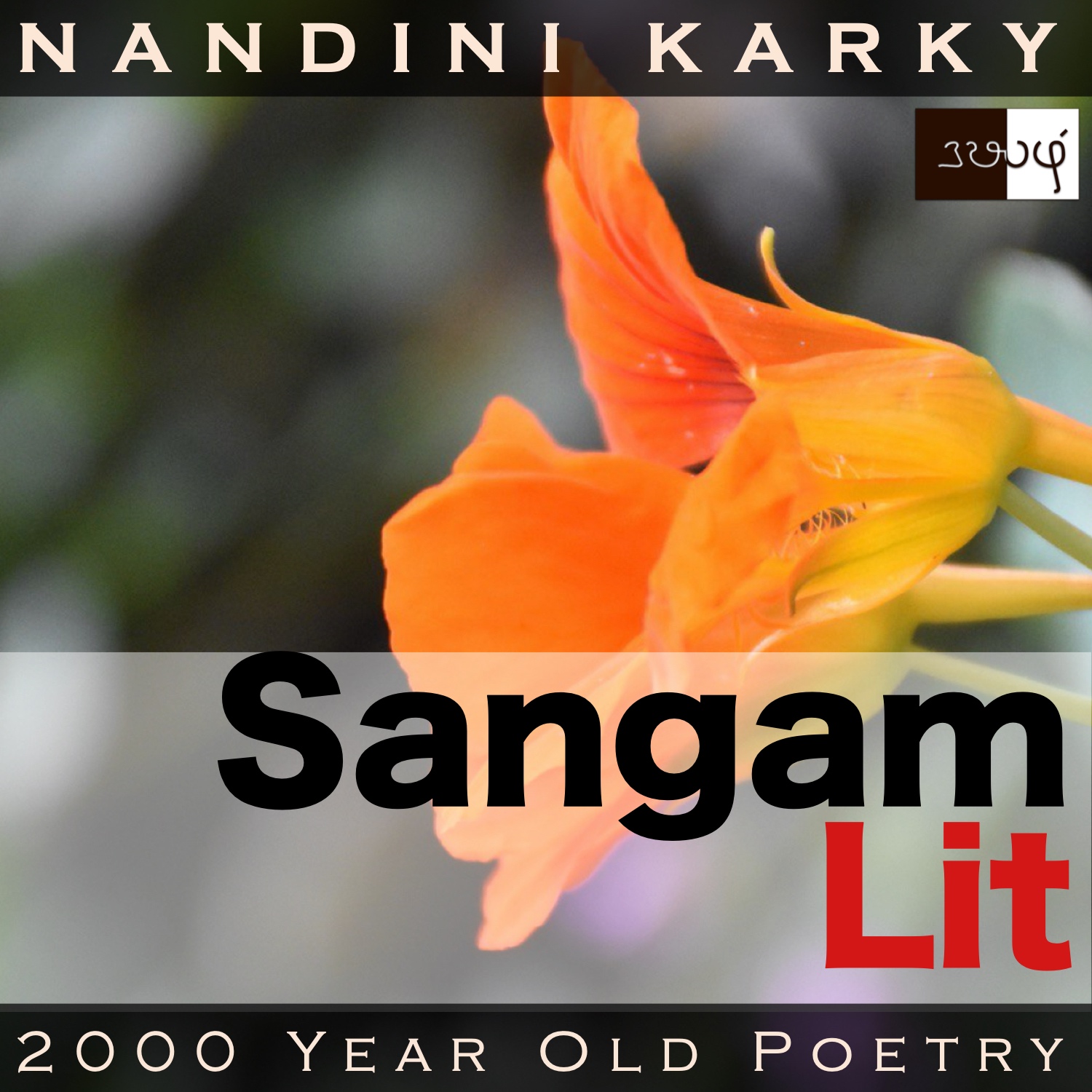Podcast: Play in new window | Download
Subscribe: Apple Podcasts | Spotify | Amazon Music | Android | iHeartRadio | TuneIn | RSS | More

In this episode, we perceive a thoughtful instance of the fine art of consolation, as portrayed in Sangam Literary work, Natrinai 286, penned by Thuraikkurumaavir Paalankotranaar. Set in the drylands of ‘Paalai’, the verse speaks in the voice of the confidante to the lady, comforting her, as she struggles to handle the parting away of the man.
”ஊசல் ஒண் குழை உடை வாய்த்தன்ன,
அத்தக் குமிழின் ஆய் இதழ் அலரி
கல் அறை வரிக்கும் புல்லென் குன்றம்
சென்றோர்மன்ற; செலீஇயர் என் உயிர்” என,
புனை இழை நெகிழ விம்மி, நொந்து நொந்து
இனைதல் ஆன்றிசின்-ஆயிழை!-நினையின்
நட்டோர் ஆக்கம் வேண்டியும், ஒட்டிய
நின் தோள் அணி பெற வரற்கும்
அன்றோ-தோழி!-அவர் சென்ற திறமே?
The verse opens with ‘ஊசல் ஒண் குழை’ meaning ‘a radiant, swaying earring’ and gives a hint about the kind of jewels Sangam women used to wear. We greet a tree in the drylands in ‘அத்தக் குமிழ்’ referring to the ‘white teak’ tree that is prevalent all over the Indian subcontinent. The phrase ‘செலீஇயர் என் உயிர்’ meaning ‘let my life fade away’ echoes the dense angst in the verse. Further instances of pain can be glimpsed in ‘புனை இழை நெகிழ விம்மி’ meaning ‘whimpering and making the well-crafted jewels slip away’ and ‘நொந்து நொந்து இனைதல்’ meaning ‘crying over and over again’. ‘ஆயிழை’ is a word that makes a noun from a woman’s adornment and it means ‘one who is wearing splendid jewels’. Yet another reference to jewellery appears in ‘நின் தோள் அணி பெற’ meaning ‘to adorn your arms with fine jewels’. Ending with ‘அவர் சென்ற திறமே’, which means ‘the reason for his departure’, the verse nudges us to move towards the light of meaning.
The man and lady had been leading a happy, married life when the man had to part away from the lady, in search of wealth. When the man is away, the lady languishes in pining. One day, seeing the lady in a ruinous state, the confidante says to her, “My friend, making your fine jewels slip and fall, you ceaselessly cry. Filled with inconsolable suffering, you say, ’Akin to a bright, dangling earring, appears the drylands ‘kumizh’ tree’s beautiful petaled flowers. Decorating rocky spaces beneath, the fruits, akin to gold coins, fall with a resounding sound. Such barren trees fill the desolate landscape of the hills, through which my lord traverses. Let my life part away too!’ O bejewelled one! If you think about it, only to bring wealth and prosperity to his well-wishers and to adorn the arms of the one who has become one with him, you, my friend, he has parted thither!” With these words, the confidante helps the lady see the core reason for the man’s departure, so as to gain a deeper perspective and resolve the pain of pining!
Time to explore the nuances! The confidante starts her response by first echoing the words of the lady back to her. The lady, with tears flowing down, had described to the confidante a scene from the drylands where the man is treading on. There, the ‘Kumizh’ tree with its ‘earring-like’ flowers and ‘gold-coin-like’ fruits is now standing barren. The flowers and fruits have fallen and decorate the hot rocks beneath the tree. The lady says that the man is walking through such a barren landscape at the moment. Unable to bear his absence, the lady concludes wishing that her life would part away too. The confidante repeats these words back to the lady and describes how the lady has been suffering immensely. Then, the confidante affectionately addresses the lady as ‘one who wears elegant jewels’ and comes to the core thought. Why has the man gone where he has gone? The confidante asks this question to the lady and says if she thinks about it, she will know that he has gone in search of wealth only for two reasons. One, so that he can aid his friends in their hour of need and two, so that he can beautify his beloved with jewels. Saying this, the confidante concludes that if the lady considers this, her pain is sure to fade away!
The first thought I had after reading this verse, was the abundance of elements related to gold, wealth and jewels. Even though the verse may sound materialistic, that is not all it has to offer. For instance, the ‘Kumizh’ tree! This tree is also known as ‘gamhar’ tree and has been valued for its medicinal benefits from ages past. Reading its long list of benefits, one struck me and that was how the fruits of this tree were used to alleviate excessive thirst. Now consider how this tree seems to be growing on the drylands and what a boon for travellers on long journeys in the summer. Trust nature to provide comfort where it’s most needed!
Now, let’s dissect the confidante’s response to understand deeper. There can be no effective balm to one suffering other than a concerned person, who listens with sincerity, and the confidante embodies this in the very beginning. She repeats the words of the lady and even describes the non-verbal emotions flooding through her friend. Then, after conveying this empathy, the confidante turns the lady’s attention from feeling to thinking. She does this by pointing out the core reason for why the man has parted away and in that, she etches the noble character of the man, who cares for the well-being of those around him. If that sounds like a generic purpose, the confidante also comes closer home to the lady’s heart and says, he also cares about making his lady happy. Although happiness may not be handy at the moment, in the long run, the confidante assures happiness is coming the lady’s way. What better recipe to bring solace to a stricken heart!




Share your thoughts...